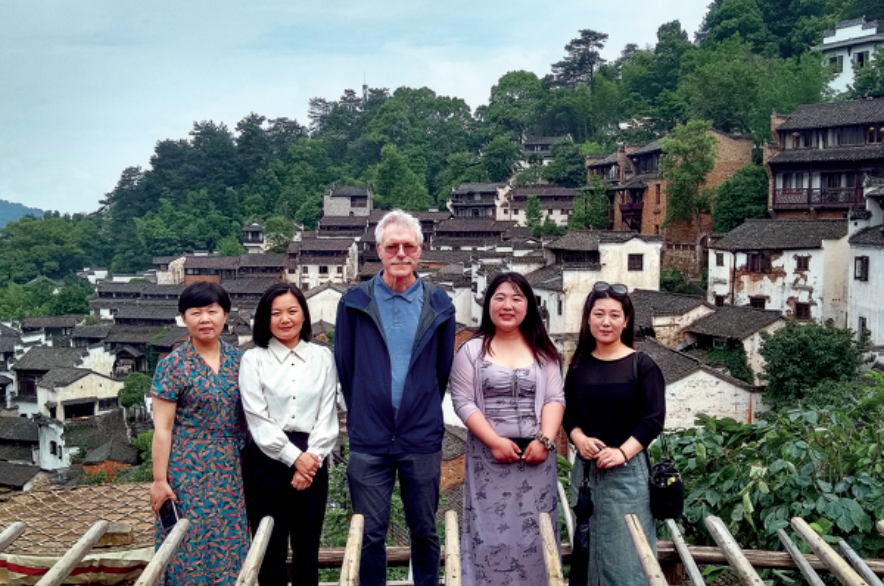US professor sets out to fight anti-China rhetoric, challenge prevailing narratives
Academic calls for more exchanges to bridge gap between Washington and Beijing


Editor's note: As the People's Republic of China celebrates the 75th anniversary of its founding this year, China Daily asked prominent international figures to reflect on their relationship with the country and to talk of the direction in which they see it going.
In the complex landscape of US-China relations, where headlines often paint a picture of tension and mistrust, Professor Stephen Roddy stands as a refreshing voice of reason and cultural understanding.
His recent journey through China, a country he first visited more than four decades ago, provided him with a perspective that challenges the prevailing narrative and invites US citizens to see beyond the rhetoric.
Roddy is a professor of languages, literatures and cultures at the University of San Francisco, specializing in East Asian studies. He is also a chair professor at the Xueheng Institute for Advanced Studies at Nanjing University.
Roddy embarked on a tour of China in May at the invitation of Nanjing University, Henan Normal University and several others. He took high-speed rail lines across the country, from bustling cities to serene countryside, and visited classrooms filled with eager Chinese students.
As he traveled in Anhui, Jiangsu, Jiangxi and other provinces, Roddy saw a China that defied the gloomy portrayals often found in Western media. "I just couldn't believe all the solar panels everywhere," he told China Daily. "China is doing lots of great things to help alleviate, and hopefully, slow down global warming. There are just so many good things happening in China."
A fluent Chinese speaker, Roddy relished the opportunity to converse with locals during his travels. He was met with warmth and openness.
"I never had anyone express any kind of hostility," he shared. "They knew I was American, and they were happy to meet me and talk to me. It was just so nice to have those interpersonal conversations."
Such exchanges, Roddy believes, are the key to bridging the gap between the two nations. "I just feel like there's so much good that can happen when people talk to one another and learn about one another," he said. "Chinese are very well informed about the US, so we need to learn more about China."
Roddy's first visit to China was in 1982 when the country was just beginning to open its doors to the world. He went back to Beijing as a graduate student in 1985 and spent a year studying at Peking University for his dissertation research. He started going back to China about 10 years ago and had "wonderful experiences".
Now, four decades later, he said the transformation he witnessed was nothing short of remarkable. "People's daily life has changed dramatically," Roddy observed. "People live very well now, and transportation is so easy."
It wasn't just the material improvements but the sense of safety and contentment among the Chinese people that made a lasting impression. "I think China today is very much appreciated by everyone. That was my impression that people are very happy that things are," he said.
What also interested Roddy was the Chinese people's candor about the problems they face. "Obviously, every country has its own issues, and people were very open about issues that China faces now," he noted. "They don't see the current age as perfect. They see that there are changes that could be made, and especially on the economy and other things."
Openness, realism
That openness and realism, Roddy believes, is a "great attitude" and one of China's greatest strengths.
Roddy's interactions with Chinese people also shed light on China's ethnic diversity.
In 2013, he returned to China for the first time since the 1980s. During that trip, he visited west Hunan, a region he had long wished to explore, and then formed a deep connection that continues to this day.
A chance encounter with Hunan native writer Peng Xueming led to Roddy translating Peng's best-selling memoir, which chronicles the life of the writer's mother, a member of the Miao ethnic group.
He spent a few years on the project, which became a gateway for him to delve into the rich cultural tapestry of the region.
This interaction with the writer gave him an insight into the world of ethnic groups in China whom he hadn't really had that much contact with before. The area, he discovered, is home not only to the Miao but also to the Tujia ethnic group, renowned for their singing and step-dancing traditions.
Roddy's experience translating the book and his immersion in the cultures of west Hunan broadened his understanding of China's complex multicultural landscape.
Roddy expressed optimism about China's evolving "multiculturalism".
"China is indeed in the process, I think, of really developing an interesting new kind of multiculturalism," he said, encouraging others to look beyond surface-level assessments and engage more deeply with China's diverse cultural realities.
Roddy's observation offers a counterpoint to the often negative portrayals in Western media of China's treatment of ethnic groups.
"I think Americans, who see so much about the Uygurs in particular these days, should see the broader picture and how many of these local peoples are certainly not rebelling, and actually benefiting from the economic strides that China has been making over the last 20 years," Roddy asserted.
Frustrated by what he sees as misinformation, Roddy has taken an active role in combating the anti-China rhetoric. He is involved in a peace activist campaign called "China Is Not Our Enemy", organized by the anti-war organization CodePink, which aims to provide a more balanced view of the country.
Roddy participated in a recent petition organized by CodePink to demand PBS release a documentary film the company made years ago on China's poverty-relief efforts. The film, Voices from the Frontline: China's War on Poverty, was aired just once and then shelved by PBS under pressure from domestic politicians who criticized the film for "making China look too good".
He pointed to the US "weapons industry", which is "profiting enormously from all of their money that's going into these weapons that are supposedly preventing China from taking us over". "But that's essentially an absurd idea," he said.
And that is why the US people need to see the PBS documentary, which documented China's efforts to lift 800 million people out of poverty in the past four decades, said Roddy.
"There is so much propaganda (in the US). They just keep turning up the volume, and it's so wrongheaded. It's just so utterly false," said Roddy. "The more that people can learn about the real China, the less they will be influenced by this propaganda that's coming out of multiple sources, but mostly, I think it's coming out of the weapons industry."
In the last 10 years, Roddy has been writing about eco-criticism, or environmental literature, an area where he sees great potential for collaboration between the United States and China.
"We had a lot of conversations about how the world can work together to do things about the current ecological crisis that we're facing," Roddy said.
Concerns voiced
However, he expressed concerns about the US' increasing restrictions on research collaboration with the Chinese side.
"My main complaint is that there aren't enough exchanges, and there needs to be a lot more," he stressed.
Roddy said many in the scientific community fear that severing the research connections will have dire consequences for US science and technology.
"China has always been very humble and always trying to find new ideas. Now it's time for us to do the same and look at what China has done in many areas, including in the humanities," he said.
Roddy remains optimistic about the future of US-China relations. He finds hope in the rationality and open-mindedness of the Chinese people he's encountered.
"They're much more in tune and well informed about what's going on here than many Americans," he said.

































